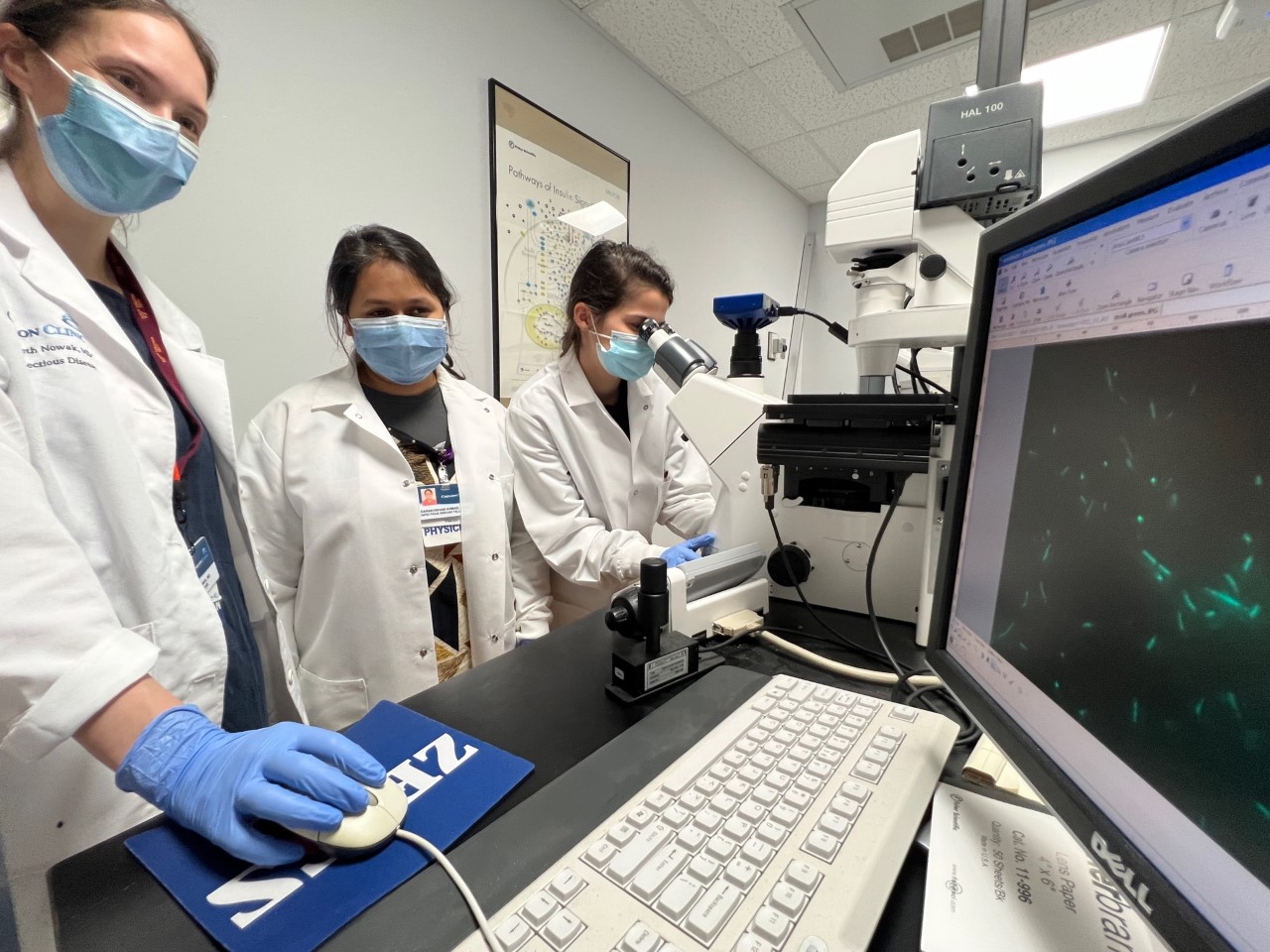
Research Lab
Carilion’s Research Laboratory, located at Carilion Roanoke Community Hospital (CRCH), is equipped with advanced scientific equipment and software applicable to a wide variety of research pursuits.
Basic Science Research Lab

The Carilion Basic Science Research Lab (CBSRL) is a 2,000-square-foot laboratory space located on the fourth floor of CRCH. It was designed in 2008 to support a variety of research initiatives and allow for collaboration among researchers. It originally focused on infectious diseases, and over the years it has been strategically designed to accommodate all types of research activities for staff and area students.
The lab fosters an environment where medical questions can lead to answers that impact the care we provide our patients. The main laboratory functions as an all-purpose research area where full-time users receive their own research bench and have access to molecular biology instrumentation and equipment. Full-time users also have the ability to analyze samples using specialized equipment.
"The lab would not be a lab without the talented individuals in it," said Radford University Carilion (RUC) student Willow Lehrer. "As a biomedical student learning all about this fascinating scientific world, I am grateful to have this wonderful lab with so many resources at my fingertips."
The purpose of our research is to promote excellence in the quality of care to our patients. Carilion's Research and Development (R&D) Department supports two research approaches:
- Basic research with the objective of contributing to the general body of knowledge; it expands understanding of a particular field of study
- Applied research whose objective is to seek a solution to a specific problem; this includes clinical research and clinical trials
Often, knowledge gained from basic research translates to applied research. Supporting science researchers and clinician researchers promotes possibilities for collaboration—and collaboration has the potential to transform the overall research experience.
"Doing research in the Basic Science Lab as a medical student has allowed me to translate bench work to the clinic to improve the treatment of patients with brain injury," explained Virginia Tech Carilion School of Medicine (VTCSOM) student Liliana Ladner. "This interdisciplinary resource is a much-needed bridge between basic science and clinical medicine."
In 2008, the forward-thinking lab design was intended to support a variety of research and allow for collaboration among the researchers. It was outfitted with what was then state-of-the-art instrumentation. Jayasimha Rao, Ph.D., our current senior research scientist, was the first scientist to conduct research at CBSRL. The focus was on infectious diseases and first research project resulted in identifying a bacterial protein (Pseudomonas) associated with pathogenicity—the ability to make people sick. CBSRL researchers received naming rights to this protein. They named it rahU.
CBSRL's Areas of Focus
- Microbiology: One project involves Dr. Rao, who is working with physician researchers to investigate bacterial genes to determine how they are becoming increasingly resistant to antibiotics. The research includes testing of microorganisms to determine the genetic code of the bacteria that may lead to antibiotic resistance.
- Molecular biology: VTCSOM students work with faculty and physicians to conduct original, hypothesis-driven research. Recent projects include analyzing blood samples for the presence of genes that may be associated with certain diseases. These results may lead to improvements in diagnostics and therapeutics.
- Cellular biology: An RUC project for this focus area includes growing nerve cells. The researchers use one of the lab’s biological safety cabinets and an incubator that controls temperature and atmosphere.
- Clinical research support: The R&D team supports sponsored and investigator-led clinical research projects, while CBSRL provides processing, storage and shipping solutions.
Research begins with a question and some curiosity. Typically, a researcher will do literature reviews to see what is already known about the question and where there may be gaps in knowledge; then they will design a research proposal.
The R&D team helps with this process, including:
- Literature review
- Protocol design
- Evaluation of available science and feasibility of protocol
- IRB application and other compliance assistance
- Search for funding sources and grant writing assistance
- Experimental execution and management
- Data interpretation
- Experimental troubleshooting
- Sample processing
If you have questions, contact Susan Tolliver, CBSRL, at satolliver@carilionclinic.org.
Institutional Biosafety Committee
The Institutional Biosafety Committee (IBC) is a standing committee responsible for reviewing all research activities conducted by faculty, staff, students and/or visiting scientists on Carilion Clinic property that involve the use of biological agents. Biological agents are defined as:
- Microorganisms
- Recombinant or synthetic nucleic acid molecule experiments as defined by NIH guidelines
- Materials derived from human and non-human primates
- Biological toxins
Carilion Clinic IBC Charter
IBC Forms
Institutional Biosafety Committee forms for applying, progressing, changing, closeout and incident reporting.